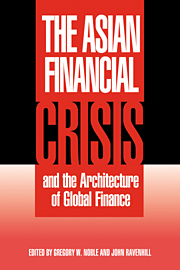Book contents
- Frontmatter
- Contents
- Abbreviations
- List of Figures
- List of Tables
- List of Contributors
- Preface
- 1 Causes and Consequences of the Asian Financial Crisis
- 2 Capital Flows and Crises
- 3 The Political Economy of the Asian Financial Crisis: Korea and Thailand Compared
- 4 The Good, the Bad and the Ugly? Korea, Taiwan and the Asian Financial Crisis
- 5 Indonesia: Reforming the Institutions of Financial Governance?
- 6 Political Impediments to Far-reaching Banking Reforms in Japan: Implications for Asia
- 7 Dangers and Opportunities: The Implications of the Asian Financial Crisis for China
- 8 The International Monetary Fund in the Wake of the Asian Crisis
- 9 Taming the Phoenix? Monetary Governance after the Crisis
- 10 The Vagaries of Debt: Indonesia and Korea
- 11 The New International Financial Architecture and its Limits
- Notes
- Bibliography
- Index
10 - The Vagaries of Debt: Indonesia and Korea
Published online by Cambridge University Press: 05 June 2012
- Frontmatter
- Contents
- Abbreviations
- List of Figures
- List of Tables
- List of Contributors
- Preface
- 1 Causes and Consequences of the Asian Financial Crisis
- 2 Capital Flows and Crises
- 3 The Political Economy of the Asian Financial Crisis: Korea and Thailand Compared
- 4 The Good, the Bad and the Ugly? Korea, Taiwan and the Asian Financial Crisis
- 5 Indonesia: Reforming the Institutions of Financial Governance?
- 6 Political Impediments to Far-reaching Banking Reforms in Japan: Implications for Asia
- 7 Dangers and Opportunities: The Implications of the Asian Financial Crisis for China
- 8 The International Monetary Fund in the Wake of the Asian Crisis
- 9 Taming the Phoenix? Monetary Governance after the Crisis
- 10 The Vagaries of Debt: Indonesia and Korea
- 11 The New International Financial Architecture and its Limits
- Notes
- Bibliography
- Index
Summary
Debt has been central to the Asian economic crisis and its spread to Russia and beyond. Some of the major weaknesses in the way debt was dealt with in the Latin American debt crisis of the 1980s remained serious problems when the Asia crisis struck – and were accentuated by it. This particularly related to the way that private external debt was handled. Private market actors, especially in a situation of accelerated financial globalisation, are still not well-equipped to cope with debt workouts unless the number of actors they face is relatively concentrated. Indonesia illustrates this problem in two major ways. First, its private external debt problem is particularly complicated, dispersed and serious. Indonesia's situation is further complicated by the fact that it is the only Asian crisis country to have an external debt problem large and serious enough to warrant rescheduling its public sector debt to its bilateral creditors via the Paris Club (of official creditors). Private international banks are often referred to as the London Club creditors, after the steering committees of lead syndicate banks used since the 1980s to reschedule debt owed to them by private banks and firms and debtor states.
This chapter focuses on three issues: the way the London Club banks operated in two Asia crisis countries, a comparison of that experience with the Paris Club rescheduling for Indonesia, and the complicated interplay of the Paris and London Club stories with other key actors in the Asia crisis, in particular the International Monetary Fund (IMF), the World Bank, international merchant bank advisers and international debt lawyers.
- Type
- Chapter
- Information
- Publisher: Cambridge University PressPrint publication year: 2000
- 1
- Cited by

